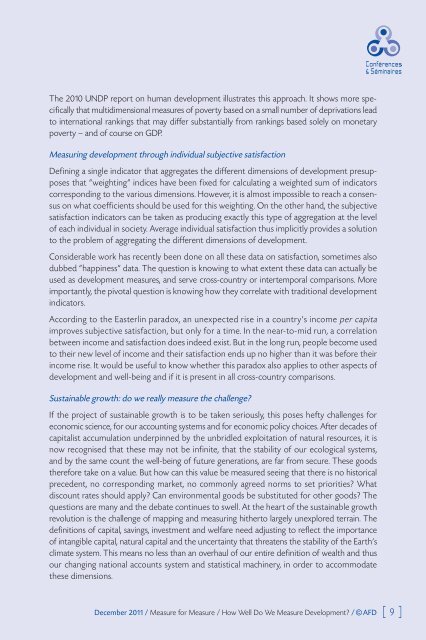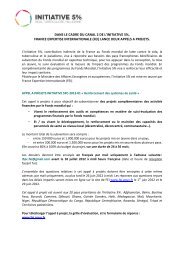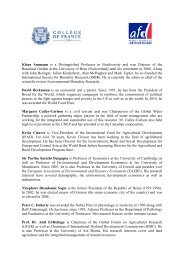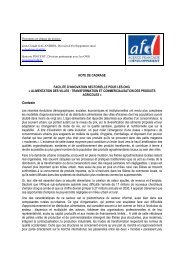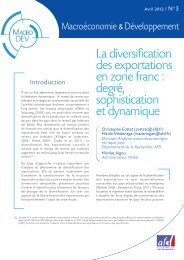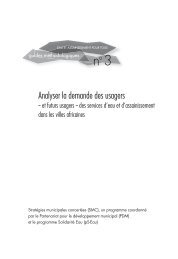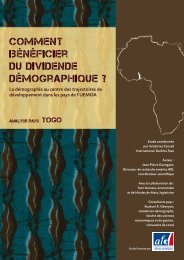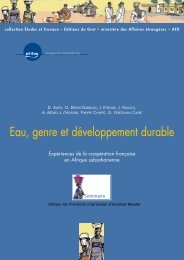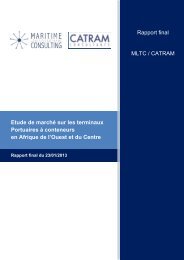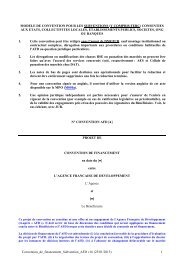Paris School of Economics - L'Agence Française de Développement
Paris School of Economics - L'Agence Française de Développement
Paris School of Economics - L'Agence Française de Développement
Create successful ePaper yourself
Turn your PDF publications into a flip-book with our unique Google optimized e-Paper software.
The 2010 UNDP report on human <strong>de</strong>velopment illustrates this approach. It shows more specifically<br />
that multidimensional measures <strong>of</strong> poverty based on a small number <strong>of</strong> <strong>de</strong>privations lead<br />
to international rankings that may differ substantially from rankings based solely on monetary<br />
poverty — and <strong>of</strong> course on GDP.<br />
Measuring <strong>de</strong>velopment through individual subjective satisfaction<br />
Defining a single indicator that aggregates the different dimensions <strong>of</strong> <strong>de</strong>velopment presupposes<br />
that “weighting” indices have been fixed for calculating a weighted sum <strong>of</strong> indicators<br />
corresponding to the various dimensions. However, it is almost impossible to reach a consensus<br />
on what coefficients should be used for this weighting. On the other hand, the subjective<br />
satisfaction indicators can be taken as producing exactly this type <strong>of</strong> aggregation at the level<br />
<strong>of</strong> each individual in society. Average individual satisfaction thus implicitly provi<strong>de</strong>s a solution<br />
to the problem <strong>of</strong> aggregating the different dimensions <strong>of</strong> <strong>de</strong>velopment.<br />
Consi<strong>de</strong>rable work has recently been done on all these data on satisfaction, sometimes also<br />
dubbed “happiness” data. The question is knowing to what extent these data can actually be<br />
used as <strong>de</strong>velopment measures, and serve cross-country or intertemporal comparisons. More<br />
importantly, the pivotal question is knowing how they correlate with traditional <strong>de</strong>velopment<br />
indicators.<br />
According to the Easterlin paradox, an unexpected rise in a country’s income per capita<br />
improves subjective satisfaction, but only for a time. In the near-to-mid run, a correlation<br />
between income and satisfaction does in<strong>de</strong>ed exist. But in the long run, people become used<br />
to their new level <strong>of</strong> income and their satisfaction ends up no higher than it was before their<br />
income rise. It would be useful to know whether this paradox also applies to other aspects <strong>of</strong><br />
<strong>de</strong>velopment and well-being and if it is present in all cross-country comparisons.<br />
Sustainable growth: do we really measure the challenge?<br />
If the project <strong>of</strong> sustainable growth is to be taken seriously, this poses hefty challenges for<br />
economic science, for our accounting systems and for economic policy choices. After <strong>de</strong>ca<strong>de</strong>s <strong>of</strong><br />
capitalist accumulation un<strong>de</strong>rpinned by the unbridled exploitation <strong>of</strong> natural resources, it is<br />
now recognised that these may not be infinite, that the stability <strong>of</strong> our ecological systems,<br />
and by the same count the well-being <strong>of</strong> future generations, are far from secure. These goods<br />
therefore take on a value. But how can this value be measured seeing that there is no historical<br />
prece<strong>de</strong>nt, no corresponding market, no commonly agreed norms to set priorities? What<br />
discount rates should apply? Can environmental goods be substituted for other goods? The<br />
questions are many and the <strong>de</strong>bate continues to swell. At the heart <strong>of</strong> the sustainable growth<br />
revolution is the challenge <strong>of</strong> mapping and measuring hitherto largely unexplored terrain. The<br />
<strong>de</strong>finitions <strong>of</strong> capital, savings, investment and welfare need adjusting to reflect the importance<br />
<strong>of</strong> intangible capital, natural capital and the uncertainty that threatens the stability <strong>of</strong> the Earth’s<br />
climate system. This means no less than an overhaul <strong>of</strong> our entire <strong>de</strong>finition <strong>of</strong> wealth and thus<br />
our changing national accounts system and statistical machinery, in or<strong>de</strong>r to accommodate<br />
these dimensions.<br />
December 2011 / Measure for Measure / How Well Do We Measure Development? / © AFD [ 9 ]


